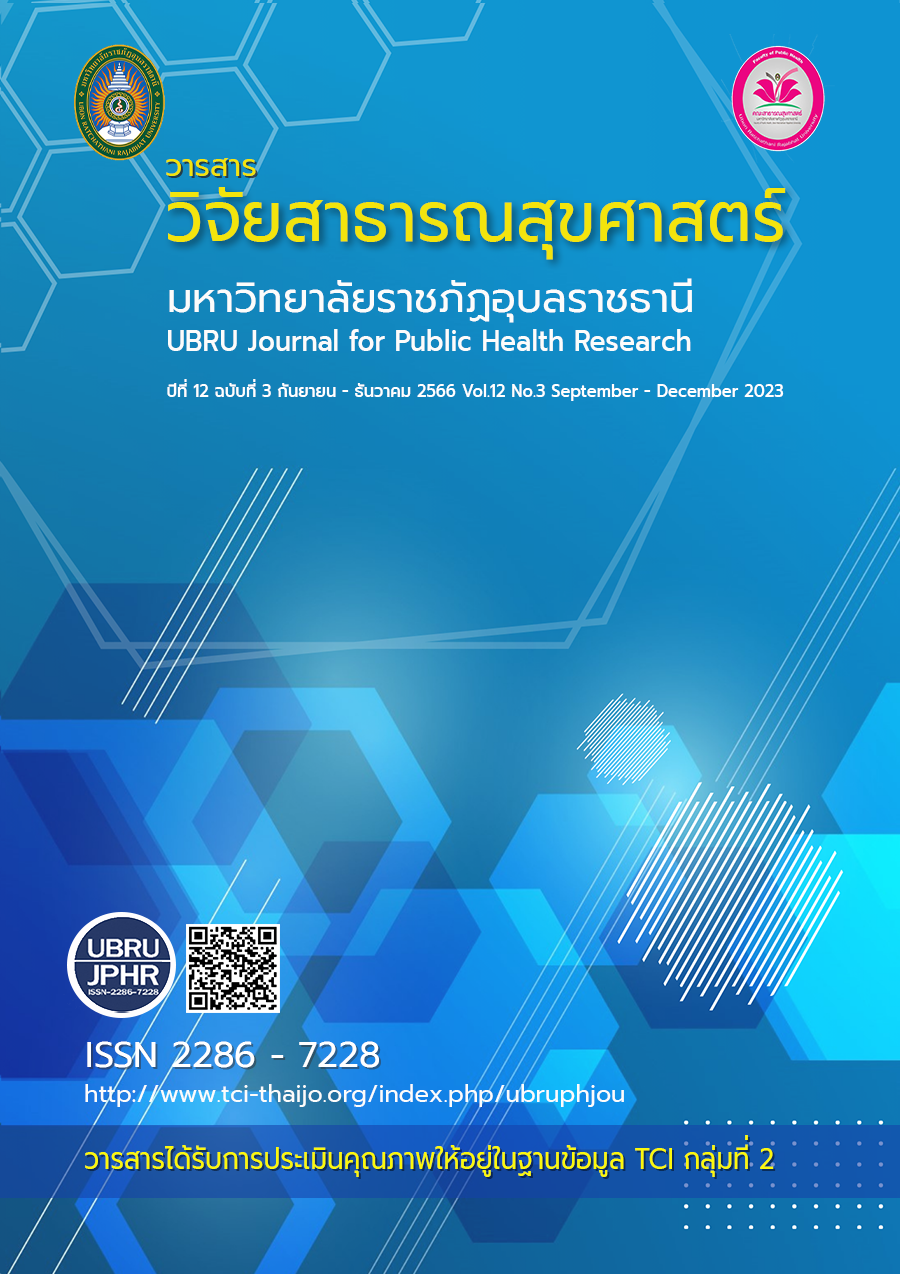Food based dietary for good health behavior of undergraduate students at Eastern Asia University
Keywords:
Dietary behavior, food based dietary, undergraduate studentsAbstract
Nutrition is an essential aspect of a healthy lifestyle and development. During education age, changes in an individual's lifestyle may affect food based dietary for good health behavior. This Cross-sectional descriptive study aim to study food based dietary for good health behavior of undergraduate students at eastern asia university and predisposing factor, enabling factors, reinforcing factors related to food based dietary for good health behavior of undergraduate students at Eastern Asia University.
The sample consisted of 328 Undergraduate students at Eastern Asia University. Choosing a sample size by stratified random sampling. Study during January–March 2023. Data were collected using questionnaires. The quality of the tool was tested by three experts and the values of the Index of Item Objective Congruence ranged between 0.66-1.00. The Cronbach's alpha coefficient of the questionnaire was 0.904. Data were analyzed by descriptive statistics: frequency, percentage, mean, standard deviation. The correlation was analyzed by Chi-square Test and Pearson’s Product Moment Correlation Coefficient.
The overall food based dietary for food based dietary for good health behavior of undergraduate students at eastern asia university was at a good level. The factors related to food based dietary for good health behavior of undergraduate students at Eastern Asia University consisted of The year of study (p=0.008), faculty (p<0.001), the access to food shops (r=0.215, p-value=<0.001), the Influence of Advertising (r=0.376, p-value = <0.001), the Influence of man (r=0.395, p-value=<0.001)
The distribution of a variety of food should be promoted with regard to food that is nutritious and easy to access and purchase. Organizing activities to promote food consumption behavior according to nutritional principles and correct food choices according to food sanitation principles. Choose materials that students are interested in and that are easily accessible.
References
กมลวรรณ สุวรรณ. (2563). ปัจจัยที่มีความสัมพันธ์กับพฤติกรรมการบริโภคอาหารในเด็กมัธยมศึกษาตอนต้นที่มีภาวะน้าหนักเกินเกณฑ์ในเขตอำเภอเมือง จังหวัดยะลา. วารสารสาธารณสุขล้านนา. 17(1), 40-51.
ณัฐนิชา แก่นศรี และวณิชชา คันธสร. (2565). ปัจจัยที่มีความสัมพันธ์กับพฤติกรรมการบริโภคอาหารจานด่วนของนักศึกษาระดับปริญญาตรี มหาวิทยาลัยราชภัฏกำแพงเพชร.วารสารวิทยาศาสตร์สุขภาพและการสาธารณสุขชุมชน. 5(2), 23-34.
นัชชา ยันติ และอภิญญา อุตระชัย. (2564). พฤติกรรมการบริโภคอาหารในนักศึกษาปริญญาตรี มหาวิทยาลัยแห่งหนึ่ง จังหวัดปทุมธานี. วารสารความปลอดภัยและสุขภาพ. 14(1), 25-36.
ปาจารีย์ ซิบังเกิด, ประสงค์ ตันพิชัย และนิรันดร์ ยิ่งยวด.(2564). ปัจจัยที่เกี่ยวข้องกับพฤติกรรมการบริโภคอาหารปลอดภัยของนิสิตระดับปริญญาตรี มหาวิทยาลัยเกษตรศาสตร์ วิทยาเขตกำแพงแสน.วารสารสังคมศาสตร์วิจัย. 25(1), 170-191
มัณทนาวดี เมธาพัฒนะ. (2560). ปัจจัยที่มีความสัมพันธ์กับพฤติกรรมการบริโภคอาหารของนักศึกษาพยาบาล. วารสารคณะพยาบาลศาสตร์ มหาวิทยาลัยบูรพา.25(3), 20-29.
ลักษณิน รุ่งตระกูล. (2562). การประเมินภาวะโภชนาการ และพฤติกรรมสุขภาพเพื่อส่งเสริมสุขภาพวัยรุ่นไทย. สำนักโภชนาการ กรมอนามัย. ค้นเมื่อ 10 พ.ย 2565, จาก https://nutrition2.anamai.moph.go.th/th/download-06/download?id=41109&mid=32009&mkey=m_document&lang=th&did=14576.
วราพรรณ ไหมเหลือง, คันธมาทน์ กาญจนภูมิ, ชัดเจน จันทรพัฒน์ และกัลยา ตันสกุล. (2563). ปัจจัยที่มีความสัมพันธ์ต่อพฤติกรรมการบริโภคอาหารหวานของนักเรียนระดับมัธยมศึกษาตอนต้นในอำเภอเมือง จังหวัดยะลา. หาดใหญ่วิชาการระดับชาติและนานาชาติ (มหาวิทยาลัยหาดใหญ่) ครั้งที่ 11. ค้นเมื่อ 18 พ.ย 2565, จาก Available from https://www.hu.ac.th/Conference/proceedings2020/doc/G12/G12-1-029He-PP_วราพรรณ%20ไหมเหลือง%20(P1938-1956).pdf
วิรุท นนสุรัตน์. (2562). พฤติกรรมการบริโภคอาหารของผู้สูงอายุเขตสุขภาพที่ 8. วารสารโรงพยาบาลมหาสารคราม (โรงพยาบาลมหาสารคราม). 16(3), 130-137.
สำนักงานกองทุนสนับสนุนการสร้างเสริมสุขภาพ. (2563). กินอย่างฉลาดกินตามโภชนบัญญัติ 9 ประการ. ค้นเมื่อ 7 พ.ย 2565, จาก https://resourcecenter.thaihealth.or.th/media/DOzA
สำนักงานกองทุนสนับสนุนการสร้างเสริมสุขภาพ. (ม.ป.ป.) กินอย่างฉลาดกินตามโภชนบัญญัติ 9 ประการ.ค้นเมื่อ 7 พ.ย 2565, https://www.thatoomhsp.com/userfiles/กินอย่างฉลาดตามหลักโภชนบัญญัติ%209%20ประการ(1).pdf
สำนักงานสถิติแห่งชาติ. (2561). การสำรวจพฤติกรรมการบริโภคอาหารของประชากร พ.ศ 2560. สำนักพิมพ์สถิติแห่งชาติ. ค้นเมื่อ 3 พ.ย 2565, จาก http://www.nso.go.th/sites/2014/DocLib13/ด้านสังคม/สาขาสุขภาพ/Food_consumption_behavior_of_the_population/2560/รายงานฉบับสมบูรณ์.pdf.
Best, J. W. (1977). Research in Education. (3 rd. ed). New Jersey: Prentice Hall Inc.
Bloom, B.S. et al. (1971). Handbook on formative and summative evaluation of student learning. New York: McGraw Hill.
Daniel, W.W. (2010). Biostatistics: Basic Concepts and Methodology for the Health Sciences (9 thed.). New York: John Wiley & Sons.
Green, L. W., & Kreuter, M. W. (2005). Health program planning: An educational and ecological approach. New York: McGraw Hill.
Downloads
Published
How to Cite
Issue
Section
License
Copyright (c) 2023 คณะสาธารณสุขศาสตร์ มหาวิทยาลัยราชภัฏอุบลราชธานี

This work is licensed under a Creative Commons Attribution-NonCommercial-NoDerivatives 4.0 International License.
เนื้อหาและข้อมูลในบทความที่ลงตีพิมพ์ในวารสารวารสารวิจัยสาธารณสุขศาสตร์ มหาวิทยาลัยราชภัฏอุบลราชธานี ถือเป็นข้อคิดเห็นและความรับผิดชอบของผู้เขียนบทความโดยตรงซึ่งกองบรรณาธิการวารสาร ไม่จำเป็นต้องเห็นด้วย หรือร่วมรับผิดชอบใดๆ
บทความ ข้อมูล เนื้อหา รูปภาพ ฯลฯ ที่ได้รับการตีพิมพ์ในวารสารนี้ ถือเป็นลิขสิทธิ์ของวารสารฯ หากบุคคลหรือหน่วยงานใดต้องการนำทั้งหมดหรือส่วนหนึ่งส่วนใดไปเผยแพร่ต่อหรือเพื่อกระทำการใดๆ จะต้องได้รับอนุญาตเป็นลายลักอักษรณ์จากบรรณาธิการวารสารนี้ก่อนเท่านั้น


